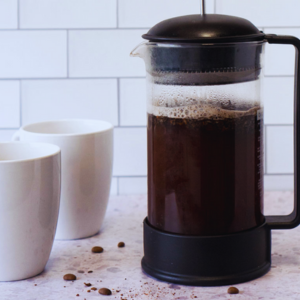For those who appreciate fine coffee, it’s no secret that the choice of coffee beans profoundly influences the taste and fragrance of your brew. When it comes to utilizing a French press, the selection of coffee beans becomes even more crucial. In this extensive guide, we will Navigate the realm of Best Coffee For French Press and assist you in uncovering the top coffee beans to enhance your brewing journey.
What Is A French Press?
A French press represents a manual coffee brewing technique employing an immersion-style brewer. Essentially, finely ground coffee beans are steeped and strained to produce a perfect cup of coffee. In this brewing method, coffee grounds and water steep together, contrasting with the process of a drip coffee maker where water flows over the coffee grounds. Notably, the metal mesh filter in a French press permits the coffee beans’ natural oils to pass through into your cup, delivering a rich and flavorful profile.
Tracing The Origins Of The French Press
As expected, the invention of what we now call the French press is credited to a Frenchman, although some coffee folklore suggests it might have been an Italian inventor, depending on the version you follow. Like many innovations, it emerged out of necessity when the Frenchman realized he had forgotten to add coffee to his already boiling water. To prevent the coffee from simply floating on the surface, he improvised by purchasing a metal screen from a passing merchant and fashioning a makeshift plunger from a stick. This marked the inception of the first French press.
Over the following century and a half, the French press has undergone significant evolution, from the introduction of stainless steel finishes to the refinement of the double mesh metal filter to reduce sediment in our coffee cups. Today, it stands as one of the most recognizable home-brewing devices, consistently delivering a full-bodied and rich cup of coffee.
Selecting The Best Coffee For Your French Press
If you’re in search of the finest French press coffee to purchase, here are three options from Onda Origins, a beloved small-batch coffee roaster of mine:
Cocarive
This is a lighter medium roast sourced from a cooperative in Brazil. It boasts a nutty flavor profile and is exceptionally easy to savor, making it akin to an everyday breakfast coffee due to its milder taste compared to other roasts.
Ivonne Herrera
This medium roast showcases single-origin beans cultivated by a woman-owned farm in Guatemala. It offers delightful notes of milk chocolate and a touch of fruity essence, reminiscent of a holiday treat with a hint of fruit liqueur.
Neo Noir
Among these three medium roasts, Neo-Noir stands as the darkest. It comprises beans from Ivonne Herrera and a few other farms, resulting in a smoky and robust character. However, it’s not overly roasted, maintaining a pleasant level of sweetness with a prominent nutty undertone.
How Does A French Press Work?
In contrast to many of today’s popular brewing techniques like Chemex, V60, and Kalita, the French press operates on the principle of immersion brewing. In this method, the ground coffee and water coexist for a period, as opposed to a pour-over process where water flows continuously through the coffee bed. With immersion brewing, you can anticipate a thorough extraction and certain coffee origins and roast profiles are better suited to this brewing style. Rest assured, we’ve outlined essential factors to consider and even have some coffee recommendations specifically tailored for French press enthusiasts.
Tips For Achieving The Best Flavor In Your French Press Coffee
- Opt for carafes made of borosilicate glass or another glass type that won’t impact your coffee’s taste or release plastic particles into your brew, unlike plastic versions. Fortunately, many glass carafe options are budget-friendly. If you plan to brew for a group, consider larger stainless steel models to elevate your brewing experience.
- Look for an airtight coffee plunger equipped with a steel, double-mesh filter to keep coffee grounds in the carafe and out of your cup.
Instructions For Using A French Press
- Determine the coffee-to-water ratio Most coffee enthusiasts, including my taste buds, recommend a coffee-to-water ratio of 1:15, which translates to using 3 tablespoons of coffee grounds for every 1 cup of water. However, feel free to adjust this ratio to match your taste preferences and caffeine requirements.
- Boil the water Heat the water to about 200°F and allow it to rest for a minute before pouring it over the coffee grounds.
- Grind your coffee beans Grind the coffee beans to achieve a coarse consistency similar to sea salt, or use the medium setting on your coffee grinder if available.
- Add the coffee grounds to the French press.
- Pour filtered water over the coffee grounds in a circular motion until they are fully saturated. Allow the coffee to bloom by letting it sit for 30 seconds.
- Stir the crust that forms on the top.
- Fill the French press with the remaining water and let it steep for 3-4 minutes.
- Plunge the press and savor your coffee!
Which Coffee Varieties Are Ideal For French Press Brewing?
Following this in-depth exploration of the coffee world, I’ve developed a deeper appreciation for the art of brewing a superb cup of coffee. When I say “good,” I’m referring not only to delightful taste but also to the health benefits it can offer. Coffee beans originating from Central and South America, as well as Indonesia, are typically well-suited for the French press brewing method. These beans often feature a nutty and chocolatey flavor profile.
For the finest results, it’s recommended to grind your coffee beans to a coarse consistency, similar to sea salt, or opt for a medium grind. When it comes to your French press, medium-roast to dark-roast coffee beans are your optimal choice. Below, I’ll share my top recommendations for both medium and dark roast options.
Why Coffee Beans Matter
The quality of the coffee beans you choose is fundamental to crafting an exceptional cup of coffee. Similar to wine grapes, coffee beans vary in variety, origin, and roast level, all of which significantly influence the ultimate taste. Specifically for French press brewing, it’s essential to select beans that can endure the extended steeping process and yield a rich and robust flavor.
What Is The Best Coffee Brand To Use In A French Press?
Determining the “best” coffee brand for your French press can be a matter of personal taste, as coffee preferences vary. Nonetheless, there are some general principles to bear in mind when choosing coffee for your French press:
Freshness Is Key
The foremost consideration in achieving exceptional coffee is the use of freshly roasted beans. Check for a roast date on the coffee packaging and opt for beans roasted recently. Coffee beans start losing their flavor and aroma soon after roasting, so fresher beans are preferred.
Whole Beans Are Ideal
It’s advisable to purchase whole-bean coffee and grind it just before brewing. This approach guarantees maximum freshness and flavor. For French press brewing, a coarse grind size is recommended.
Single-Origin vs. Blends
Some individuals favor single-origin coffee, sourced from a specific region or even a single farm, while others prefer blends, which combine beans from various origins. Experimenting with both types can help you discover your preferences.
Roast Level Flexibility
French presses accommodate a range of roast levels, from light to dark. Personal taste plays a significant role here. Lighter roasts often feature nuanced flavors, while darker roasts tend to be bolder and richer.
Embrace Quality
Seek out reputable coffee brands known for their commitment to quality. Specialty coffee roasters, in particular, prioritize sourcing high-quality beans and typically offer a selection suitable for French press brewing.
Maintaining The Freshness Of Coffee Beans
To ensure your coffee beans stay fresh, store them in an airtight container, away from light and heat. Avoid refrigeration, as coffee beans can absorb unwanted odors.
Grinding Your Coffee Beans
For uniform and precise grinding, consider investing in a burr grinder. It’s important to note that a coarse grind is the key to success when using a French press.
Exploring Flavor Profiles Of Coffee Beans
Different coffee beans offer a wide range of flavors, ranging from fruity and floral to nutty and chocolatey. Experiment with various bean varieties to discover your preferred flavor profile.
Consider Fair Trade And Organic Options
Promote ethical and sustainable coffee production by opting for beans that carry Fair Trade or organic certifications. It’s a choice that benefits both your conscience and your palate.
Explore Single-Origin Coffees
Single-origin coffees offer the opportunity to savor the unique flavors of specific regions. Delve into the world of coffee terroir for a one-of-a-kind tasting experience.
Discover Popular Coffee Blends Suitable For French Press
Blended coffees combine beans from diverse origins to create a harmonious and flavorful cup. Seek out blends specifically crafted for French press brewing.
Find The Best Coffee For Decaf Enthusiasts
Even those who prefer decaffeinated coffee can enjoy the delights of French press brewing. Look for decaf beans that maintain their full flavor profile without the caffeine content.
Discovering Your Preferred French Press Roast
Typically, medium to dark roasts work exceptionally well for French press brewing. If you like to enhance your coffee with milk and sugar, the richer, darker roast can be an ideal choice. A touch of milk wonderfully complements the deep, chocolatey, and earthy flavors that these roasts offer.
Are There Flavor Profiles That Complement Immersion Brewing?
Absolutely! Since a French press yields a full-bodied coffee, it’s advisable to seek out flavor notes that are rich and nutty, such as dark chocolate, hazelnut, and almonds. These flavors harmonize beautifully with the immersion brewing method.
Understanding The Distinctions Between The French Press And Other Brewing Methods
The French press stands apart from other brewing methods in two key aspects: the filter type it employs and the duration of the brewing process. This distinctive combination results in French press coffee being characterized by a fuller body and a heightened expression of the inherent sweet flavor profiles found in coffee beans.
The Role Of Filters
In conventional drip coffee machines, Chemex, and Aeropress, paper filters are the norm. These filters capture coffee compounds, effectively removing them from your cup, resulting in a clean and sharper taste.
A French Press Coffee Maker Uses A Metal Filter Instead
In contrast, a French press coffee maker utilizes a metal filter. The metal filter permits coffee compounds to pass through into your cup, allowing you to savor the intricate notes present in the coffee. Coffee, as Tupper explained, possesses a higher degree of chemical complexity compared to wine, and metal filters enable you to discern nuances that may be muted by paper filters.
The Other Distinct Variable: Brew Time
What truly sets the French press apart is its brewing duration. Tupper elaborates that the French press employs an immersion brewing technique, immersing coffee in a sealed environment with water at approximately 200°F, without allowing anything to flow out for approximately 9 minutes. This extended steeping period effectively extracts the sugars from the coffee, emphasizing the inherent sweetness of the beans you use.
Conclusion
In the realm of coffee, the French press opens a door to a deeper appreciation of flavors and fragrances. Armed with the right beans, a precise grind, and some practice, you can relish every sip of your homemade brew. So, embrace the artistry of French press coffee and elevate your morning ritual. If this article has piqued your interest, we encourage you to pay a visit to our website Time Speed Magazine for a deeper dive into a treasure trove of knowledge.
Best Coffee For French Press FAQs
Is It Acceptable To Use Pre-Ground Coffee For A French Press?
While it’s feasible, it’s always recommended to use freshly ground beans for the best flavor.
What’s The Optimal Brewing Duration For A French Press?
Aim for a steeping time of approximately 4 minutes to extract the ideal flavors.
Are There Specific Coffee Bean Brands You Endorse?
Brands may differ, but seek out beans with the qualities outlined in the article.
How Can I Reduce The Bitterness Of My French Press Coffee?
You can control bitterness by adjusting the steeping time and grind size to suit your preferences.
Can I Use A French Press For Brewing Tea?
Certainly! French presses work well for steeping loose-leaf tea as well.


